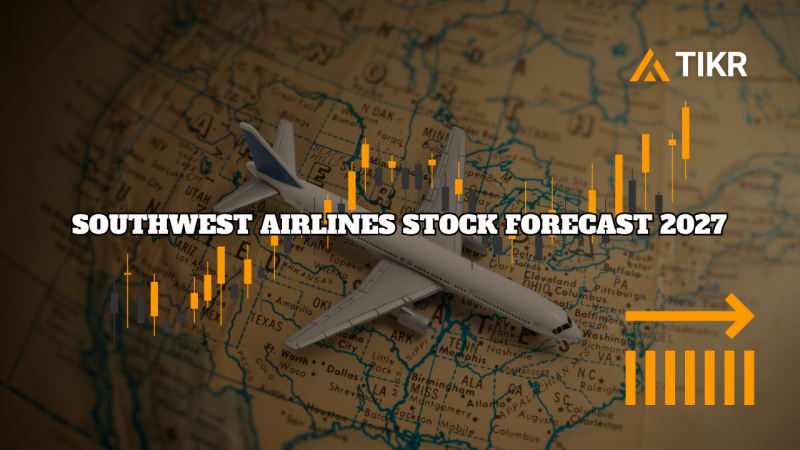Southwest Airlines Co. (NYSE: LUV) has struggled to regain its pre-pandemic form. Rising labor costs, limited international exposure, and operational challenges have capped profitability. The stock trades near $33/share, roughly unchanged over the past year as investors wait for stronger execution and earnings consistency.
Recently, Southwest announced plans to introduce assigned seating and premium boarding options, marking a major shift from its traditional open-seating model. Management also reaffirmed its goal to restore pre-pandemic margins by 2027, supported by cost discipline and network optimization. These moves show the company is actively adjusting its strategy to stay competitive while improving customer experience and profitability.
This article explores where Wall Street analysts expect Southwest to trade by 2027, based on consensus forecasts and TIKR’s valuation models. These figures reflect analyst estimates, not TIKR’s own predictions.
Unlock our Free Report: 5 AI compounders that analysts believe are undervalued and could deliver years of outperformance with accelerating AI adoption (Sign up for TIKR, it’s free) >>>
Analyst Price Targets Suggest the Stock Is Already Priced In
Southwest trades near $33/share today. The average analyst price target is $34/share, suggesting the stock is already fairly valued in the near term. Forecasts are tightly clustered, showing cautious sentiment across Wall Street:
- High estimate: ~$46/share
- Low estimate: ~$24/share
- Median target: ~$35/share
- Ratings: 4 Buys, 2 Outperforms, 10 Holds, 3 Underperforms, 3 Sells
For investors, this means the market already reflects much of Southwest’s expected recovery. Analysts appear hesitant to assign significant upside until the company demonstrates consistent margin expansion and better cost control. The optimism around travel demand is balanced by concerns over efficiency and execution risk.

See analysts’ growth forecasts and price targets for Southwest Airlines (It’s free!) >>>
Southwest: Growth Outlook and Valuation
The company’s fundamentals appear stable, but not particularly strong:
- Revenue is projected to grow ~5% annually through 2027
- Operating margins are expected to stay near ~5%
- Shares trade at ~18× forward earnings
- Based on analysts’ average estimates, TIKR’s Guided Valuation Model using a 17.9× forward P/E suggests ~$50/share by 2027
- That implies about 50% total upside, or roughly 20% annualized returns
These figures suggest Southwest could recover meaningfully if profitability improves and cost discipline holds. The stock looks attractively valued for a gradual turnaround, but execution will be key to unlocking this potential.
For investors, Southwest represents a patient recovery story with solid upside if management delivers on its margin restoration plan and maintains steady travel demand.

Value stocks like Southwest Airlines in as little as 60 seconds with TIKR (It’s free) >>>
What’s Driving the Optimism?
Analysts remain cautiously optimistic about Southwest’s recovery. The airline’s strong brand loyalty, resilient leisure travel demand, and efficient point-to-point network remain key advantages. Load factors have stayed healthy even as competition intensified, showing that travelers continue to favor Southwest’s reliability and pricing model.
Management’s renewed focus on cost efficiency and fleet modernization also gives reason for optimism. The decision to explore assigned seating and premium boarding options signals flexibility in adapting to customer preferences and boosting revenue per passenger.
For investors, these efforts suggest Southwest has the right levers to gradually restore margins and rebuild profitability over the next few years.
Bear Case: Debt and Execution Risk
Even with these positives, Southwest faces meaningful risks. The company’s debt load remains elevated following years of high capital spending and slower cash generation, limiting flexibility if fuel prices rise or demand softens.
Competition from ultra-low-cost carriers adds pressure, while larger network airlines continue expanding into leisure routes. Labor costs have climbed, and any operational missteps could quickly erode profitability.
For investors, the main concern is that slower cost improvements or weaker free cash flow could delay valuation recovery and limit upside potential.
Outlook for 2027: What Could Southwest Be Worth?
Based on analysts’ average estimates, TIKR’s Guided Valuation Model suggests Southwest could trade near $50/share by 2027. That represents roughly 50% upside from current levels, or about 20% annualized returns, assuming steady recovery in earnings and cash flow.
While that would mark a healthy rebound, it already assumes improvement in costs and margins. To outperform these expectations, Southwest would need stronger operational execution and consistent profit growth across its network.
For investors, Southwest looks like a gradual recovery play with meaningful upside if management delivers, but limited cushion if demand slows or costs remain elevated.
AI Compounders With Massive Upside That Wall Street Is Overlooking
Everyone wants to cash in on AI. But while the crowd chases the obvious names benefiting from AI like NVIDIA, AMD, or Taiwan Semiconductor, the real opportunity may lie on the AI application layer where a handful of compounders are quietly embedding AI into products people already use every day.
TIKR just released a new free report on 5 undervalued compounders that analysts believe could deliver years of outperformance as AI adoption accelerates.
Inside the report, you’ll find:
- Businesses already turning AI into revenue and earnings growth
- Stocks trading below fair value despite strong analyst forecasts
- Unique picks most investors haven’t even considered
If you want to catch the next wave of AI winners, this report is a must-read.
Click here to sign up for TIKR and get your free copy of TIKR’s 5 AI Compounders report today.

